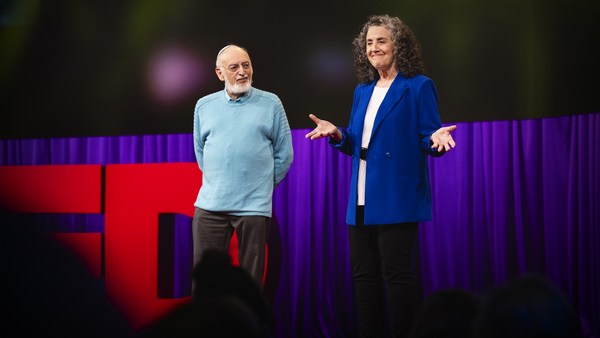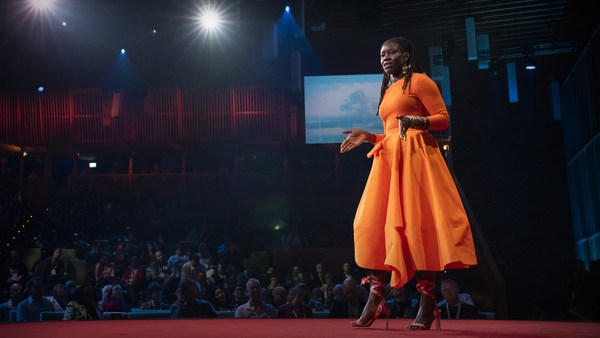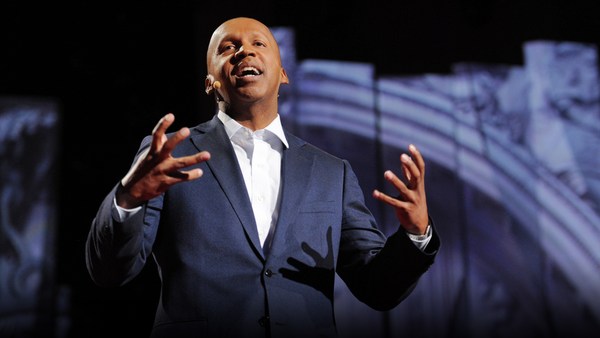This is for my mom, even though when I called her to say, "Hey, have you heard of TED, T-E-D?" She said, "Oh my God, Kelly, it's not another virus, is it?"
(Laughter)
As a 21-year-old, I was drawn to the word brave. I had a soft spot for ripping yarns and the people who could tell them. So, Odyssey on the brain, I went out adventure collecting.
Without knowing how to spell starboard or which side it referred to, I got on a 46-foot boat and I sailed from Malta to Tunisia to Sicily. I traveled 11,000 miles over 13 months to seven different countries without a plan or a phone or a credit card. Just 3,800 dollars in traveler's checks, which, if you're under 30, it was like a little booklet of --
(Laughter)
perforated, I don't know.
(Laughter)
And some expired antibiotics my mom made me bring.
(Laughter)
And then, running out of money, I landed as a nanny for two kids, four and seven, who had just lost their mom. I moved into their house, so I could cover things on the three days a week their dad worked as a flight attendant for Qantas. I smeared sunblock on their noses and Vegemite on their toast. I read them to sleep at night, I cleaned the counters.
The heavy lifting was left for the truly brave, a man who organized his emotions and answered the hardest questions, such that his kids and hers could feel a modicum of safety in a patently unsafe world. Questions like "what is cremation?" And "what happens to us if you die?" And so it is that I stood witness to the unphotographable, unmeasurable bravery of some guy named Jim in Sydney, Australia. And over the years since, I find I just can't stop cataloging these Olympic achievements in family life.
The really big things often come with a game plan and a team of experts and enough adrenaline to lift a school bus over your head. But inside every crisis you think you might be ready for are 100 dirty surprises that are not in the playbook. I had stage-3 cancer in my 30s, and I can tell you that following the chemo schedule didn't take nearly as much courage as admitting to my husband that sex felt less sexy after my boobs, which were once a real strong suit for me --
(Laughter)
Were made weird and uneven by a surgeon's knife.
Here's a surprise. My friend's father, in his final days, addled by dementia, chased her around the second floor with a fork he hid in his pajamas. They tell you there will be loss. They don't tell you you will be required to love your dad even as he's coming for you with silverware.
(Laughter)
I've interviewed 228 people for my PBS show and my podcast, people with huge careers, Grammys and Pulitzers and NBA championships. And I listened to their stories and I'm duly impressed.
But I'll tell you the ones they know the best. The ones they can't tell without choking up. The moment when Bryan Stevenson's grandmother, or Steve Kerr's father, or Samantha Power's stepfather, or Cecile Richards’ mom, was right there with the right words or the right silence at the right moment.
This bravery I'm talking about might even be better understood if you look at the smaller moments of injury in family life when there's not really an answer, or it might be your fault, or it might remind you of something you'd rather forget. Or because people are so suggestible and the wrong tone or expression or phrasing might somehow make things worse. Say your kid was dropped from a group text. They were in it, they mattered, they belonged, and then, poof. Or your husband blew the big deal at work, or your mom won't wear the diapers that would really help her get through mahjong on Wednesdays.
(Laughter)
And how should we calibrate the exquisite bravery to respond productively when someone in our family looks at us and says, "Do I know you?" "I weigh myself before and after every meal," "I hear voices," "I steal," "I'm using again," "He raped me," "She says I raped her," "I cut myself," "I bought a gun," "I stopped taking the medication," "I can't stop making online bets." "Sometimes I wonder if more life is really worth all this effort."
Bravery is the great guts to move closer to the wound, as composed as a war nurse holding eye contact and saying these seven words: Tell me more. What else? Go on. That's how the brave shine, that's all they do. They say, "Tell me more. What else? Go on." Even if they're scared of what might happen next, even if they have no training or experience to prepare them for this moment. Even if it's late and they have an early flight.
Here's two things the brave don't do. They don't take over and become the hero like it's a battle and the moves are so obvious. You just pick up a weapon with your ripped pecs and ropey veins and start slaying. In families, bravery is mostly just sitting there. With a posture that communicates "I can hear anything you want to tell me." And a nice warm face of love that says, "This is so hard, but you will figure it out."
Personally, I thought love meant action. I had no idea it could be so still. When things get hairy for one of my people, everything in me wants to grab a clipboard, make a to-do list, and start calendaring appointments. Because where there's love, there's attachment. And I don't care what the gurus say, what's happening to them is also happening, at least at some level, to us. And all that can accidentally put us center stage. No longer the coach or the minister, but rather one of the afflicted. But these gritty endurance types I've been admiring have no self and no needs and no agenda. Or at least they know how to override all that for the main character who is not us.
The second thing the brave don't do? Leave. Or hide inside work or hobbies or some other socially acceptable busyness. In my worst moments, when sitting on my hands is just unbearable, I have dreamed of going to get an MFA in Paris.
(Laughter)
Because if I can't help, why do I have to watch? It would be nice to leave and start again. Hardly anyone who's been in a long marriage hasn't at least wondered how it is that the object of their desire has become so burpy and farty.
(Laughter)
So bingo-armed and turkey-necked. Sometimes I see myself naked. Stretch marks from pregnancies, scars from cancer surgeries, other things that I don't feel you need to be visualizing right about now.
(Laughter)
And I think it's a miracle that man stays with me. But, you know, he's not untouched by time either.
(Laughter)
And that's just the physical. I mean, who here hasn't wanted to be with someone who hasn't seen us eating on the toilet or bitching at the Comcast guy?
(Laughter)
Leaving behind our own humiliating history, maybe with the nice person we met at art school in Paris.
(Laughter)
It's an option. People take it. The brave hang around. They are available and ready to bear witness.
The final act of bravery was made clear for me during a conversation with my friend Liz while she was dying at 46. She said she had this weird, long, totally convincing dream where all the parents who, as she put it, had to leave early, were gathered. And there she was, one of thousands of moms and dads, and they were on folding chairs, looking down at the world below through a thick glass floor. And in this imaginary space her subconscious created, there was one rule. You could watch your child's life unfold, but you could only intervene once. In Liz's dream, a perfect dream, she never had to intervene. She had given them enough while she was here.
The final act then of the truly brave is leaning back and letting them go. The reward for all this bravery? Not gold medals, not hero shots for Strava, not ringing the bell at the New York Stock Exchange, or owning the dinner party with Burning Man stories, I think you know who you are.
(Laughter)
Maybe not even thanks. The reward is a full human experience, complete with all the emotions at maximum dosage, where we have been put to great use and found an other-centric love that is complete in its expression and its transmission. The reward is to end up soft and humble, empty and in awe, knowing that of all the magnificence we have beheld from cradle to grave, the most eye-popping was interpersonal.
So here's to anyone who notices and reads between the lines, who asks the right questions, but not too many, who takes notes at the doctor's office and wipes butts, young and old, who listens, holds and stays. We, who, untrained and always a little off-guard, still dare to do love. To be love. That's brave.
Thank you.
(Cheers and applause)


